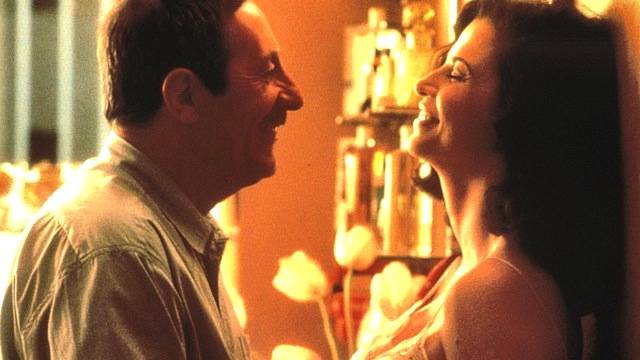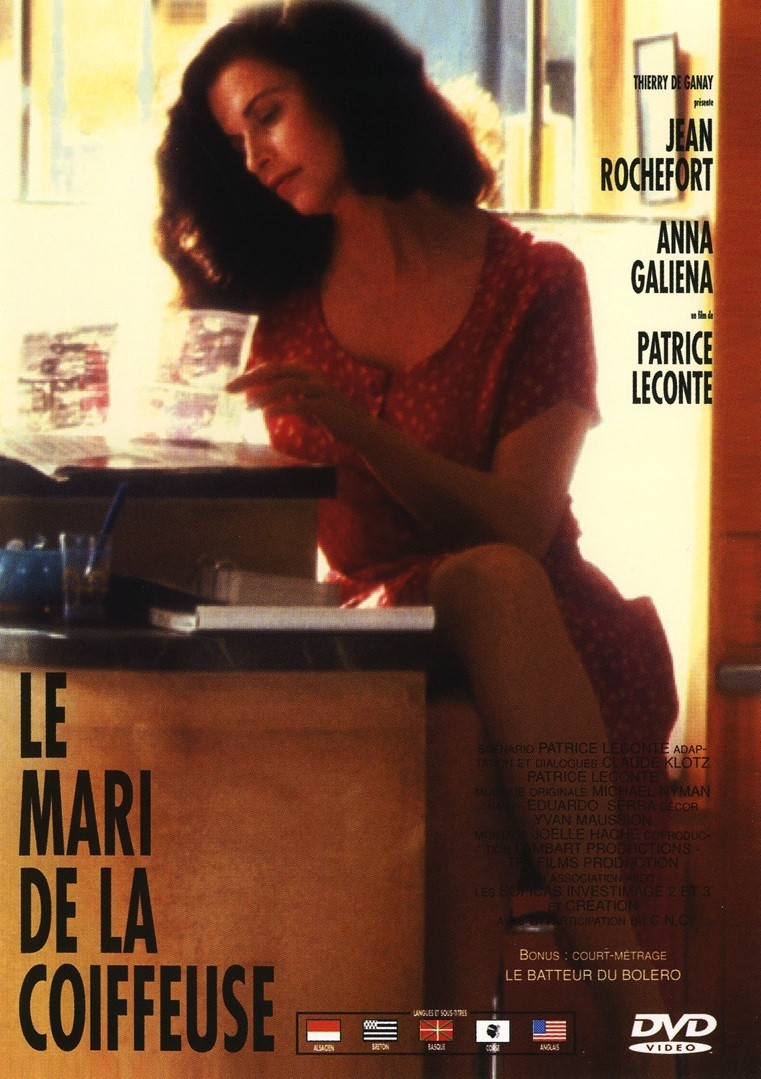
The hairdressing shop is their ocean liner, their lives are a cruise around the world. They will sail the Nile, kiss in the shadows of the Great Pyramids, see the sun set on every earthly paradise, and it will always be exactly like this. Perfect. “The Hairdresser’s Husband” (1990) tells the story of two romantics besotted with love, living in a French hairdressing salon, she reading magazines on her perch by the widow, he working crosswords on the red leather bench, the sunlight flooding in. The yellows, blues, tropical colors. The exotic music he dances to. Occasionally at some unheard signal their eyes meet and they smile in shared bliss.
Isn’t it pretty to think so. What is remarkable is that they both fully agree on this vision. From his early adolescence, Antoine (Jean Rochefort) has desired only one thing in life, to be a hairdresser’s husband. Many men have been attracted by the beauty of Mathilde (Anna Galiena), but until now, in her early 30s, none has been perfect. Perfection. That’s what they’re looking for. He has known the barbershop for years. When old Monsieur Ambroise (Maurice Chevit) retired, he gave it to her, for she would carry on in his tradition. One day, she gives Antoine a shampoo and a trim, and he says, “Will you marry me?” She doesn’t answer. Two weeks later he comes in for his next visit. She tells him yes. Her answer is yes.
“The Hairdresser’s Husband” carries their shared perfection as far as it can — further, in fact, than we might desire. Perfection admits no compromise. It is not possible in a world made of time and men and women. But how wonderful it can be. This 1990 film by Patrice Leconte is funny, as warm as a hug, as fanciful as a dream. It is a fairy tale set in a real shop on a real street with real people. Of course, the shop and the street exist only in a movie studio, and the people are characters, but that’s a movie for you. Film is an art form that permits perfection.
The film is awesome in how it begins, how it continues, and how it ends. It is profound. It is about our foolish dreams. I doubt it has ever found a single viewer who yearns to be a hairdresser’s husband, but it allows us all to understand such a thing is quite possible. He isn’t a hair fetishist. He is a hairdresser fetishist. Leconte shows us the very moment when he was seized by his desire. His young eyes are wide and solemn as he glimpses in a gap in another hairdresser’s blouse that form we all learn, as our first lesson, is the source of all goodness, love and comfort: a woman’s breast. He is lost.
Not only lost, but mad. There is no sanity in his intense focus. Is she mad? She must be. But they’re both so happy. Real life hardly seems to be a factor. We never see them eat. We never see them sleep. We know they live in a room above the shop, but we don’t see it.
Their days pass in a serene parade, sometimes enlivened by his fondness for dancing to recordings of the music of “The Arabian Nights.” He can’t dance, as he is the first to admit. But what he does is wonderful, and Rochefort’s gyrations, always with a solemn face, are very funny. Why this music? Why this dance? Why do we need to ask?
She smiles. She is radiant. She is kind, gentle, sexy. They are always in heat. While she is performing a shampoo, he kneels on the floor behind her and caresses her to ecstasy. They make love on the red leather bench. They’re in full view, but nobody ever seems to see them. They make each other very happy.
Leconte, working from his own screenplay, interrupts their solitude with customers. Two inseparable friends, always deep in a dispute. A little boy who does not want to have his hair cut. A husband who dashes in to hide from his fearsome wife, who follows him. There aren’t a lot of customers, which is all right with them. She is patient, attentive, expert. He is tactful and always helpful. The sun shines in. Their wedding day takes place in the shop, with old Monsieur Ambroise in attendance.
In a rare visit outside the shop one Sunday afternoon, they visit Ambroise in the retirement home where he lives. He observes that the home’s gardens, so well-tended, have a sort of film over them, an aura: “These are the last trees and flowers these old people will ever see.” He is not consoled by retirement. He was happy, now he is lonely. His relatives visit, but are impatient to leave. In such small dark clouds as these, Leconte allows his lovers to observe that nothing is forever.
Patrice Leconte is a director who should be better known. Like Ang Lee, he never repeats himself. Each film seems a fresh start from a new idea. His flawless “Monsieur Hire” (1989) is also about a fetishist — a voyeur. That is its only similarity with “The Hairdresser’s Husband.” His “Ridicule” (1996), set at the court of Louis XVI, involved a provincial farmer, much agitated about the need for irrigation. Told that the king listens to no one who doesn’t amuse him, he learns to be funny. He was never funny before. “The Widow of Saint-Pierre” (2000), based on a true story, involves a man condemned to the guillotine on a remote French island off Canada. The colony lacks a guillotine. The courts are sticklers for the letter of the law. The condemned man and the warden’s wife undergo a transformation during the wait for the guillotine to arrive from France. It is very deep and moving.
“My Best Friend” (2007) is about a man who learns he truly has no friends, only acquaintances and associates. He hires a sunny taxi driver to instruct him in the act of making friends. “Man on the Train” (2003) stars French rock star Johnny Hallyday and Jean Rochefort again, as a bank robber and a retired literature teacher. Circumstances lead the teacher to admit the robber as an overnight guest. Each old man envies the other, who represents a road not traveled. “The Girl on the Bridge” (1999) is about a professional knife-thrower who hangs around bridges looking for young women about to leap off them. He offers them a job as his target. There is always the possibility he might miss. If he doesn’t, they get an interesting job with lots of travel. If he does hit them, well, what do they have to lose?
I have never seen a bad film by Patrice Leconte. As you can see, they share no genre. They share no style, either, except his clear, sure strokes at the service of his story. I have been thinking for years of including him in the Great Movies collection, but delayed, unable to choose among them. I could make an excellent case for every film I mentioned.
What they have in common is his gift for inventing unforgettable characters. Some are remarkable only in their ordinariness. They have this in common: They’re fascinating. Admit that in my brief remarks about those titles you were intrigued by every character I mentioned. The French have affection for Leconte, because he doesn’t disappoint them. But in the world market, he offers no hook or “high concept.” For the global mass audience, if it requires an entire sentence to describe a film, that’s too much complexity to deal with. Yet Leconte’s kind of film is why I go to the movies with hope.
You will have noted I revealed nothing of the destiny of his couple who are so very happy. Surely their happiness cannot last forever? No? Are you sure? Surely we believe we are immune to the sad outcomes experienced by others. I want to say this much about the ending: It is a happy ending. Happy for her, happy for him, and their love remains inviolate and undiminished. Can you deny that?




















